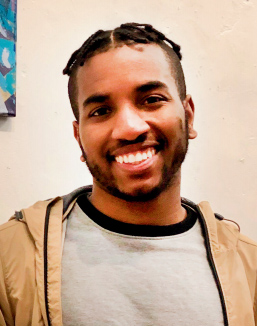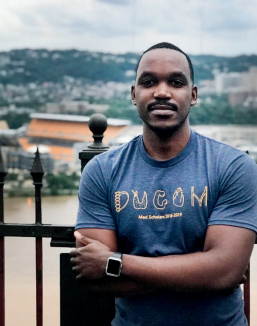Being Black in Medical School
In May, William Justice, MD Class of 2022, delivered a letter to Drexel University College of Medicine leadership. Cosigned by nearly 40 medical students, the letter provided insight to the often misunderstood plight of Black people. It also expressed his pain and anger as a Black man about the injustices experienced by Black people in America, most recently the killings of George Floyd and countless others by law enforcement. Justice described the effects of both individual and systemic racism on himself and his classmates, as well as his disappointment in the College of Medicine for the lack of acknowledgement of George Floyd's death or the impacts it had on students of color. On May 30, the College of Medicine announced that a town hall would be held that week to focus on the needs of the community in a time of national unrest and pandemic.
The original agenda called for the Offices of Diversity, Equity and Inclusion and Student Counseling to respond to these events and discuss available resources for the Drexel community, and did not include time for student voices to be heard. Drexel's Student National Medical Association (SNMA) chapter asked to have students speak at the meeting, so they could discuss their experiences of racism at Drexel and ask for change within the organization. Two of those students were Brett Mitchell and Ayomide Igun. We asked them to reflect on their experiences, both as Black Drexel medical students in general and as two of the four student speakers at the town hall.
Brett Mitchell:

Brett Mitchell
Before starting med school, I didn't really think about how much pressure as a Black man I'd feel to succeed. Since there's less than 10 of us in my class, there's a constant, pressing reminder every time I'm at school of how important it is for me to become a doctor. It grimly feels like we are a dying breed. Additionally, I have to deal with being the only Black student in my small groups, which is what I have dealt with for most of my academic life. However, being involved with the school's SNMA chapter and the diversity office programs has certainly made Drexel feel more like home. These recent events have made the Black community here closer than ever, and our current bond has become my favorite part of med school. We always have each other's backs.
Leading up to the town hall, the Black students were collectively disappointed in how Drexel was initially handling the response to the George Floyd, Breonna Taylor, and Ahmaud Arbery murders and racial tensions that they sparked. We were already angry at those killings and the constant devaluing of Black life. Despite all that anger we felt, it didn't seem like Drexel was giving the Black community much time to express their grievances. In the allotted time we had, I volunteered to speak up and tell my story as a Black student. We all wanted to be strategic with our responses to truly take advantage of the short 15 minutes we had. We Zoomed almost every day to practice and devise demands. We felt that these racial tensions gave us leverage to spark positive change at our school.
I chose to speak because I wanted people to understand the things Black students go through and think about every day. I wanted to address how my braided Black hairstyle makes me self-conscious about how "professional" I look. Some students who may not have spent much time around Black people can be ignorant about aspects of Black people's plight. We wanted the school to address implicit racial biases better. I wanted to share about the shortcomings in anti-racism in the curriculum. A lot of us feel like Drexel could do a better job educating us about the health care disparities that plague the Black community in Philadelphia. It's disheartening to see Black people disproportionately dying from the coronavirus, and we need to do a better job of teaching future doctors about why that is and how we can prevent that. Our experiences and our issues matter.
I feel like the town hall went well. We got the school to release a public action plan. We also gained a lot of support from classmates and faculty.
However, I am pretty tired. Being an advocate for change is important work, of course, but it is hard. It feels like the pressure is on us, the SNMA leadership, to be the ones advocating for change, and I wish there were more of an active force behind us. It seems like SNMA is the sole anti-racism task force. But at the end of the day, we have the administration listening and we hope change can follow that.
Ayomide Igun:

Ayomide Igun
My experience as a Black medical student at Drexel has been more challenging than expected. There are only two other Black men in my class of about 260-something students. Although my high school was predominantly minority students, I attended the University of Maryland, College Park, which is less diverse, and was able to adapt and succeed while there. As someone who has navigated different cultural academic environments, I felt I would be prepared to navigate a predominantly white medical school. However, I quickly came to realize that my time at Drexel would be harder than anything I had ever experienced.
My first experience at Drexel — during orientation week, my first time stepping in the building — one of the orientation advisors got me confused with another Black male medical student. We don't look alike. One of the other advisors corrected her and she was like, "Oh, it's no big deal." I immediately sensed how awkward things had become, and in that moment I felt like I made everybody else cringe. I wanted to take myself out of the situation as fast as possible, so I quickly made my way into the auditorium.
Another thing that happened — I was left out of a text message thread for my core group. When I found out, at first it felt like it was just a mistake, because they said, "Oh, we didn't realize you were not in the group thread." But I wondered if it was really just a mistake, and that kind of ate at me for a while. (Recently, due to the current climate of increased awareness, one of my group mates apologized for excluding me from the group text and said, "We should have just come to you and asked for your number." I felt so relieved, because I struggled with what exactly happened, and he confirmed it and apologized. I sometimes think I might be overly sensitive, but his words made me see I was right for the way I felt.)
With the whole George Floyd situation, and the school's slow response to what happened, it was a galvanizing moment for the Black medical students. For the first time, we created a group chat. It was the first time we all came together in the same group. The town hall was going to happen, and we wanted everybody to get a chance to share their experiences, but ultimately the number got cut down to four people. I didn't really want to do it at first; I don't like to stand out. But I felt it was very important that there was a Black male voice.
I didn't really know how to go about preparing. Do you just speak from the heart? I ended up actually typing it out. I thought carefully about what I did and didn't want to share. Although I felt some experiences I have had would be valuable for the town hall attendees to hear about, I wanted to make sure that I didn't violate the trust and friendship of some classmates and administrators. Then we had a Zoom call where the four of us who were going to speak practiced what we were going to say. At the town hall, it went better than I expected, and that's all I can ask for.
Since the town hall, I have had mixed feelings. There hasn't been much difference in my day to day. I'm still just in my rotations in New Jersey. It does take time for change to happen, but a good number of people have reached out to me to say they were really proud of me. I feel good that I did it, and hopefully in the future I'll feel like what I did led to some change. I'm a realist. Change comes over time, and it's the little things that you do that ultimately lead to the implementation and the longevity of whatever your goal is.
Back to Top